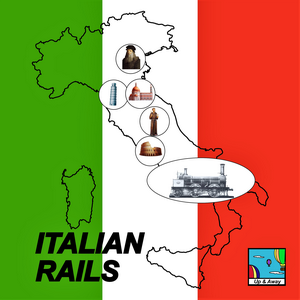
Quick rail drawing game with public-locking for two

Quick rail drawing game with public-locking for two |
Introduction:
These variant rules make all of the Empire Builder series*
games more competitive and less dependent on luck.
After the start, all of the players are working
on the same set of face-up contract cards. However,
it is not as chaotic as the supplied "Open Contracts"
rules because players must commit to a particular load
before delivering it.
If you're one of those who have complained that the game is
"n-way solitaire", give these rules a try!
Setup:
Public Cards
Instead of each person having his own cards, now there
is a public pool of cards. These cards can be "locked" for particular demands.
At any time during a player's turn, until he starts building track (or upgrades
his train), he can "lock" a card for a particular demand by placing one of his
markers on it. To do so, he must be
carrying the necessary load, and the load must not already be locking another
card. Once a card is declared to be locked, the following rules are strictly applied:
Pool Size
The number of cards in the pool must constantly be monitored in
order to satisfy the following rules (in order):
To help the track all of this, use the printout corresponding to the number of players
you have:
2 |
3 |
4 |
5 |
6
If a new card turns up and it is an event, another new card normally turns up after the event has been dealt with, but see the special case of Derailment. Note that it is possible that locking a load turns up an event, such as a flood, which could prevent the delivery of the very load that was just locked.
Derailment
If a player is derailed, he can give up a locked load. If he does so, this
unlocks the card (unless somebody else has also locked the same demand).
(Derailment and having somebody else deliver the demand are the only
ways you can "free up" a locked load.)
If someone unlocks a card (by losing the load from it), that may bring the
unlocked pool up to 2 x N, in which case no further card is drawn.
The sequence is that the derailed player must resolve the lost load before
any further cards are drawn.
If the load for a privately-locked card, after being picked up, is lost in a derailment, the player may choose to retain the card as a privately-locked card (in which case he must as usual go back to pick up the load again), or let the card go into the public pool. The public pool may temporarily go above 3 x N cards for this special case.
Pitching Demand Cards
A player who has no locked loads may give up his
entire turn and pitch three randomly selected unlocked cards. The player
may immediately lock cards (new cards or remaining old cards) using the
loads he currently has on board. (He cannot pick up new loads at his
current location for this purpose.) If locking brings up more cards
(because there were fewer than 3 x N cards) he can lock those as well.
Winning the Game
Play to the normal victory conditions, with the additional proviso that
you cannot win if you have any locked loads.
Credits
This information is entirely derived from an article by
Don Woods,
Larry Rosenberg and Dan Duval. Basically, the only change has been to
rewrite it in a more procedural format. Recommended also is the
"Crayon Rails" Deck Generator
by Don Woods.
*Examples include Empire Builder, British Rails, Eurorails, Australian Rails, Nippon Rails, Iron Dragon, India Rails, Russian Rails, Lunar Rails, Martian Rails, Italian Rails.
Possibly helpful discussion on BGG which explains that a player does not lock a card for himself, but locks on a card which one of the three loads will be delivered, regardless of who ends up delivering it.